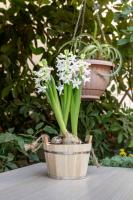Introduction
Birch trees are popular among landscapers and homeowners for their beautiful white bark and delicate foliage. When planning to plant birch trees, one of the most commonly asked questions is how far apart they should be planted. The spacing between trees can affect their growth, appearance, and overall health. In this article, we will discuss the factors to consider when deciding on the distance between birch trees.
Factors to Consider
The spacing between birch trees can depend on several factors such as the species of the tree, the environment, and its intended use. The following are some of the crucial factors to consider when deciding on the distance between birch trees:
Species of Birch Tree
Birch trees come in various species, and each has its unique growth rate and habit. Some birch trees grow taller and wider than others. For instance, the paper birch (Betula papyrifera) is a fast-growing tree that can reach up to 70 feet tall with a spread of 35 feet. In contrast, the European white birch (Betula pendula) grows more slowly and reaches about 40 feet tall with a spread of 25 feet. To determine proper spacing, research the growth habit of the particular birch species you want to plant.
Location and Environment
The location affects the growth of your birch trees. Birch trees prefer cool and moist soils, with slightly acidic to neutral pH levels. The planting distance between birch trees should take into account factors such as soil drainage, site elevation, and exposure to wind and direct sunlight.
Intended Use
The intended use of the birch trees is also another factor that determines the spacing between the trees. If you plan to use the trees for aesthetic purposes, such as landscaping, plant them closer together to form groups or clusters. For privacy, space the trees wider apart to provide an uninterrupted visual barrier.
Spacing Recommendations for Birch Trees
After considering the above factors, you can use the following recommended spacing distances for birch trees:
Birch Trees for Aesthetic Purposes
For landscaping purposes, plant birch trees 10-20 feet apart from each other. You can plant them closer together to create a natural screen, or farther apart to accentuate the individual trees' beauty. Planting in groups also creates a more aesthetically pleasing effect.
Birch Trees for Privacy and Windbreaks
Birch trees used as privacy barriers or windbreaks should be planted 15-25 feet apart, depending on the specific species' growth rate. The spacing allows the trees to grow to full maturity without competing for resources.
Care and Maintenance of Birch Trees
Once you have planted your birch trees, proper care and maintenance are crucial to their growth and survival. Here are some tips to care for your birch trees:
Watering
Birch trees require frequent watering during the first few years of planting, especially during dry spells. Water the trees deeply but infrequently to encourage deep root growth. Avoid excessive watering, as this can lead to root rot.
Pruning
Regular pruning is necessary to maintain the birch tree's shape and health. Prune the branches during the dormant period to avoid damaging the tree. Remove any damaged or diseased branches as soon as possible to prevent further damage.
Fertilizing
Apply fertilizer to your young birch trees during the spring and summer months to promote healthy growth. Use a balanced fertilizer with equal parts nitrogen, phosphorus, and potassium.
Conclusion
The spacing between birch trees can affect their growth and overall appearance. When deciding how far apart to plant birch trees, consider factors such as the species of the tree, the environment, and its intended use. Once planted, proper care and maintenance are crucial to the tree's success. With proper spacing and care, your birch trees will thrive and enhance the beauty of your landscape.

 how many times do yo...
how many times do yo... how many planted tre...
how many planted tre... how many pine trees ...
how many pine trees ... how many pecan trees...
how many pecan trees... how many plants comp...
how many plants comp... how many plants can ...
how many plants can ... how many plants and ...
how many plants and ... how many pepper plan...
how many pepper plan...






























